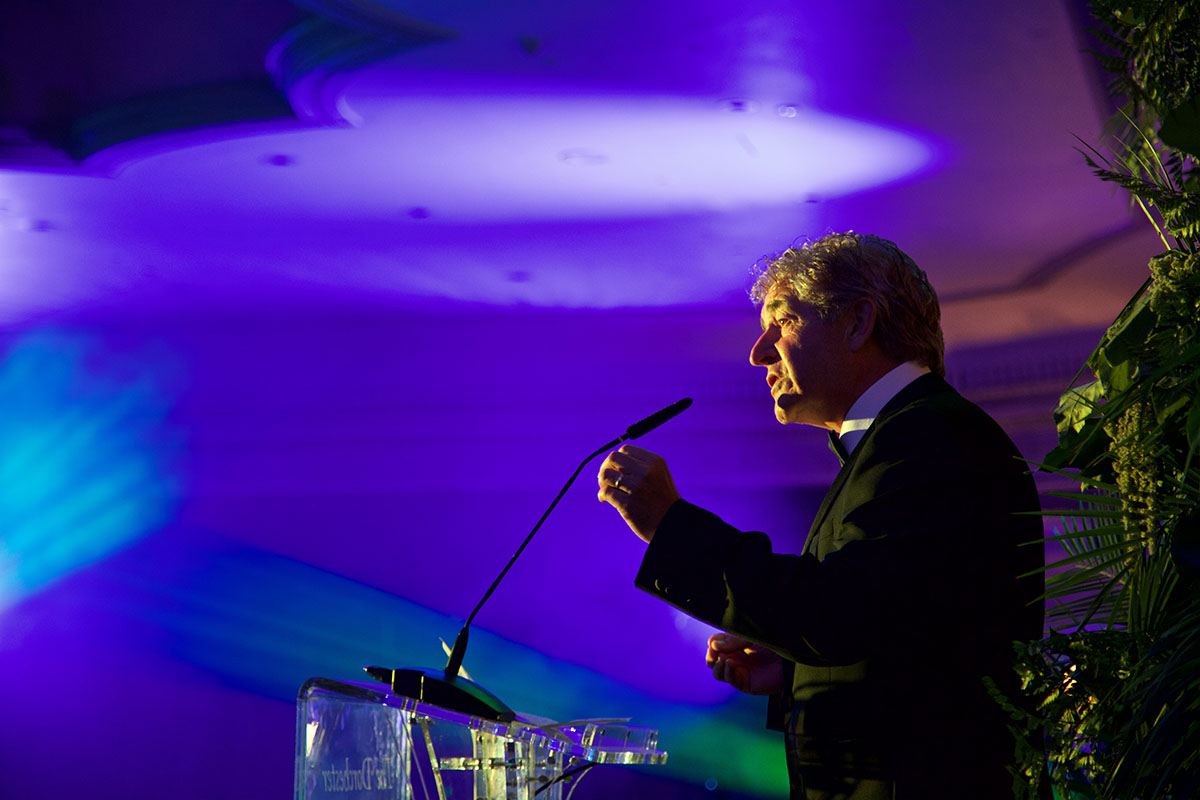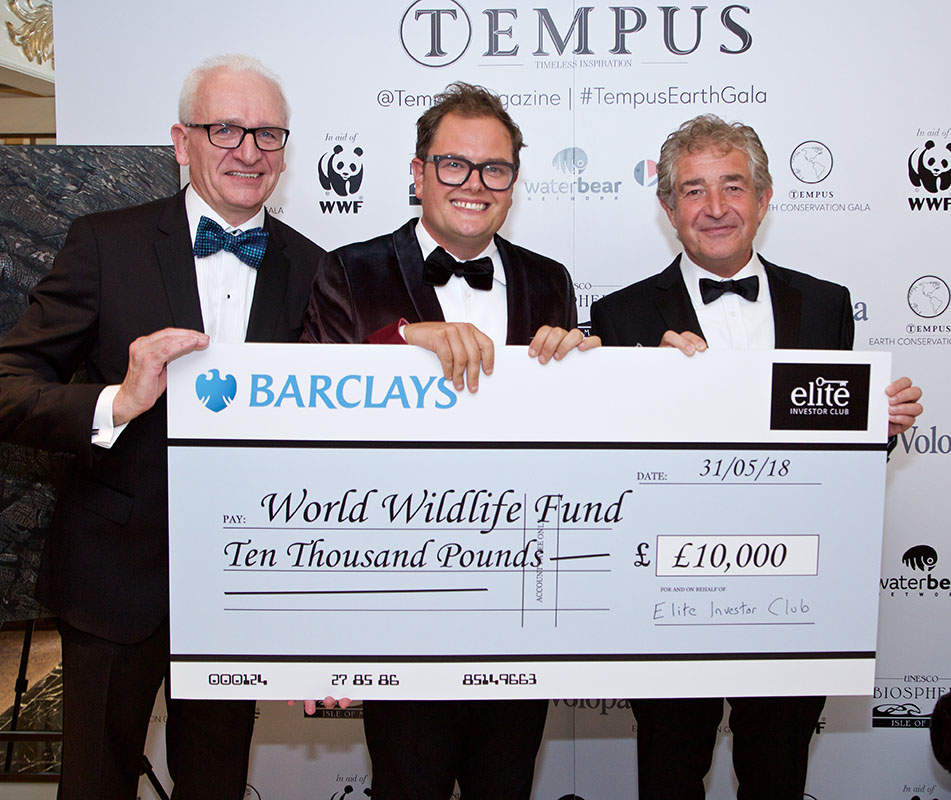This website uses cookies so that we can provide you with the best user experience possible. Cookie information is stored in your browser and performs functions such as recognising you when you return to our website and helping our team to understand which sections of the website you find most interesting and useful.
WWF’s Tony Juniper on how we can help the fight against climate change
By Michelle Johnson | 5 June 2018 | Culture
WWF’s director of advocacy and campaigns on the growing message of optimism in the environmental sector
Tony Juniper is one of the world's leading environmentalists, educating a generation of leaders in business and government to concerned individuals through his role as WWF director of advocacy and campaigns, or working with the Prince of Wales on high profile campaigns and books. With more than 25 years working at the front line of environmental advocacy, Juniper says the need for action against climate change and wildlife extinction has never been more desperate.
But despite the overwhelming odds, Juniper tells Tempus that there is hope – not just that we can prevent worsening conditions around the world, but to reverse the effects of climate change and bring endangered species back from the brink of extinction. In fact Juniper confirmed at the inaugural Tempus Earth Conservation Gala that, thanks to the efforts of WWF and its supporters, the numbers of endangered species including the giant panda, snow leopard and, for the first time, the tiger have all increased in number in the wild.
Here, Juniper speaks exclusively to Tempus's digital editor Michelle Johnson about the biggest issues we are facing, the impact we can make as individuals and the growing message of optimism in the environmental sector.
How big an impact does climate change have on WWF's work?
We have reached an unprecedented moment in the history of the Earth where we have one species – humankind – shaping conditions across the entire planet. This is seen in changes to the atmosphere, climate change, changes to the land through clearance of natural habitats and also changes to the ocean, where the sea is becoming warmer and empty of fish, but also more acidic. This is a profound set of changes and it's vital that we take action not only to stop these trends, but to reverse them, and that really is the mission of WWF.
These issues can often seem overwhelming – is it really possible for us to reverse them?
The issues are very big, but there are still many things that can be done and we're confident that all of these trends can be halted and reversed. It's not just big companies and governments that can affect change; individuals can have an impact as well. Trends like plastics in our oceans, land clearance and carbon dioxide in our atmosphere can all be traced back to consumer trends. We're all involved, and therefore we can all be part of the solution.
There is a need for optimism in all of this, because when one looks at the data and research collected by WWF you can tend to be left feeling quite overwhelmed. It's very important to remain hopeful and optimistic about what can be done, and the good news is that there's a great deal we can do. We've got everything to play for and we can still stop the worst of climate change, and avoid a mass extinction of animals and plants – but we have to act immediately. >>
Related: The first ever Tempus Earth Conservation Gala raises £100,000 for the WWF

How do we help educate and encourage people about ways individuals can take control?
One of the things that really gives me a lot of encouragement is how a lot of young people are interacting with each other and engaging with politics. During recent years it's become evident that more attention is being paid by politicians and indeed leaders of major brands, because they can see the markets and voters' priorities changing. So, the fact that we're more aware is, in itself, very powerful because then decision makers have to act and show leadership – because they know that they are being watched.
Is there anyone in the public eye who you think is doing incredible things for the environment?
One person I've worked with and really admire is the Prince of Wales. Would you believe that it will be 50 years this year since he gave his first speech on the environment, back in 1968? He's been a constant advocate for the environment ever since then and I think the way he has used his position in order to bring people together to find solutions and raise awareness of these topics has been quite amazing. Our work with him has reached different generations, but also the work he does in private is just as important. It was my privilege to be part of His Royal Highness' International Sustainability Unit and his Rainforest Project, which looked for solutions at a very high level.
But what's also amazing is the many people doing small things, from young people with start-up companies looking at waste minimisation or tackling food production, and this is the other big hope that I have. Not only do we have much greater awareness now, which is obviously inspiring policy change at high levels, but increasingly we can point to so many good examples of things that are actually happening, whereas just 20 years ago we only dreamed it could be possible.
We've seen many luxury brands recently launch sustainability and conservation initiatives within their industries. Is this a case of brands being changed by the demands of a more informed clientele?
Yes, I think it is. Time and again you can see that dynamic between public opinion and the behaviour of governments and big companies. It's really quite a profound balance. The anti-plastic movement at the moment has really caught the imagination, and businesses and individuals alike are really beginning to think about alternative ways of meeting consumers' needs. And all of that is coming off the back of people caring. It's another positive part of the story. >>
Related: Here are 5 incredible things you never knew about WWF

Campaigning is a large part of WWF's work, but how crucial is it to create an emotional reaction from the public? How challenging is it to further causes that perhaps don't benefit from the same emotive imagery as wildlife conservation?
It's only natural that people identify more with things that strike an emotional chord – the big charismatic animals and the plight of children. Environmental groups like WWF are very focused on data, research and science, and it can be a challenge to communicate that emotionally. Research is more appealing to the head when in fact most individuals, scientists included, will respond more to things that touch their heart. Sometimes the things we're doing are very complicated, remote and abstract – like climate change and the o-zone layer – so we’re always looking for ways to communicate how these issues impact the things that people really care about.
It's remarkable how everything is so interconnected. I was surprised to learn how much of an impact your landscape restoration projects have on fighting poverty within communities around the world.
You've touched on something there that I think is at the heart of the modern conservation challenge. Over the years I've become more and more convinced that we have to show people the truth of how we're utterly dependant on healthy nature and landscapes. For too long people became used to the idea that we had to sacrifice nature, destroy forests and pollute the air in order to achieve economic growth and eradicate poverty, but actually only quite recently we're rediscovering that clean, healthy environment rich in wildlife is essential for the future of human societies.
What's the most vital issue that WWF is combatting at the moment?
Top of the list for us at the moment is our food supply. Our research tells us very clearly that the reason we have this very rapid decline of nature across the wild is because of how we're feeding ourselves. Whether deforestation for farming, how we catch wild fish, the pesticides that are going into the seas, and a high proportion of greenhouse gases all come from our food system. It's certainly true that you can point to our meat supply using more resources – land, energy and water – than it would to create a plant-based food supply, but there are different kinds of meat production, some of which are benign and beneficial to our society. Organic farming, for instance, where animals are also used to restore soil fertility and are part of the farmed economy.
Does this need an industrial solution or are their ways individuals can make a difference?
Every individual can make an impact, and in fact you can start very simply. Our message is, where possible, to decrease the amount of meat you eat, and opt for better quality meat if you can – particularly avoiding factory farmed or processed meat. Eat less but better.








